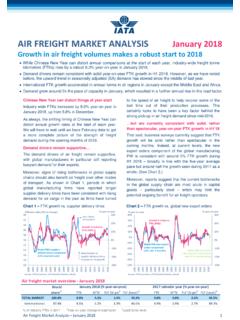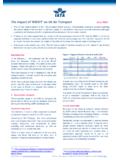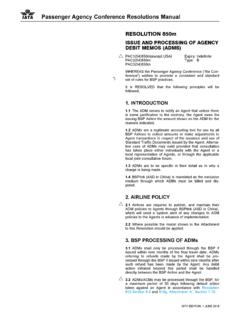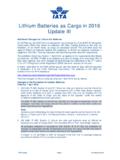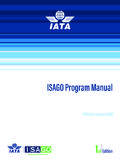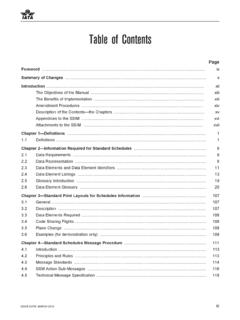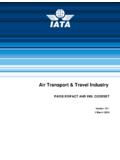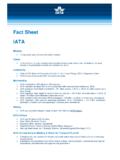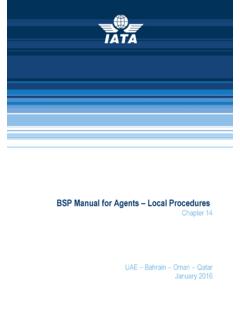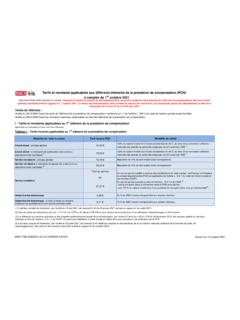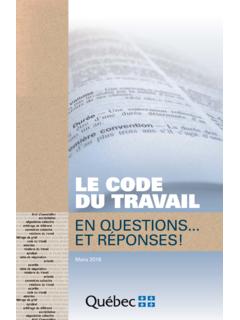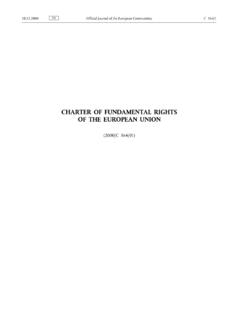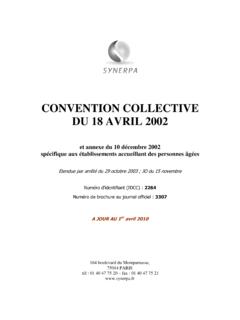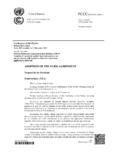Transcription of CONVENTION
1 1 CONVENTIONFOR THE UNIFICATION OF CERTAIN RULES FORINTERNATIONAL CARRIAGE BY AIRTHE STATES PARTIES TO THIS CONVENTIONRECOGNIZING the significant contribution of the CONVENTION for the Unification of Certain RulesRelating to International Carriage by Air signed in Warsaw on 12 October 1929, hereinafterreferred to as the Warsaw CONVENTION , and other related instruments to the harmonizationof private international air law;RECOGNIZING the need to modernize and consolidate the Warsaw CONVENTION and relatedinstruments;RECOGNIZING the importance of ensuring protection of the interests of consumers in internationalcarriage by air and the need for equitable compensation based on the principle of restitution;REAFFIRMING the desirability of an orderly development of international air transport operations andthe smooth flow of passengers, baggage and cargo in accordance with the principles andobjectives of the CONVENTION on International Civil Aviation, done at Chicago on 7 December1944;CONVINCED that collective State action for further harmonization and codification of certain rulesgoverning international carriage by air through a new CONVENTION is the most adequate meansof achieving an equitable balance of interests;HAVE AGREED AS FOLLOWS:Chapter IGeneral ProvisionsArticle 1 Scope of CONVENTION applies to all international carriage of persons, baggage or cargo performedby aircraft for reward.
2 It applies equally to gratuitous carriage by aircraft performed by an airtransport the purposes of this CONVENTION , the expression international carriage means anycarriage in which, according to the agreement between the parties, the place of departure and theplace of destination, whether or not there be a break in the carriage or a transhipment, are situatedeither within the territories of two States Parties, or within the territory of a single State Party if thereis an agreed stopping place within the territory of another State, even if that State is not a State between two points within the territory of a single State Party without an agreed stoppingplace within the territory of another State is not international carriage for the purposes of to be performed by several successive carriers is deemed, for the purposes of thisConvention, to be one undivided carriage if it has been regarded by the parties as a single operation,whether it had been agreed upon under the form of a single contract or of a series of contracts, andit does not lose its international character merely because one contract or a series of contracts is tobe performed entirely within the territory of the same CONVENTION applies also to carriage as set out in Chapter V.
3 Subject to the termscontained 2 Carriage Performed by State and Carriage of Postal CONVENTION applies to carriage performed by the State or by legally constituted publicbodies provided it falls within the conditions laid down in Article the carriage of postal items, the carrier shall be liable only to the relevant postaladministration in accordance with the rules applicable to the relationship between the carriers and thepostal Except as provided in paragraph 2 of this Article, the provisions of this CONVENTION shall notapply to the carriage of postal IIDocumentation and Duties of the Parties Relating to the Carriage ofPassengers, Baggage and CargoArticle 3 Passengers and respect of carriage of passengers, an individual or collective document of carriage shallbe delivered containing:(a)an indication of the places of departure and destination;(b)if the places of departure and destination are within the territory of a single State Party,one or more agreed stopping places being within the territory of another State, anindication of at least one such stopping other means which preserves the information indicated in paragraph 1 may be substitutedfor the delivery of the document referred to in that paragraph.
4 If any such other means is used, thecarrier shall offer to deliver to the passenger a written statement of the information so carrier shall deliver to the passenger a baggage identification tag for each piece ofchecked passenger shall be given written notice to the effect that where this CONVENTION isapplicable it governs and may limit the liability of carriers in respect of death or injury and fordestruction or loss of, or damage to, baggage, and for with the provisions of the foregoing paragraphs shall not affect the existenceor the validity of the contract of carriage, which shall, nonetheless, be subject to the rules of thisConvention including those relating to limitation of 4 respect of the carriage of cargo, an air waybill shall be other means which preserves a record of the carriage to be performed may besubstituted for the delivery of an air waybill.
5 If such other means are used, the carrier shall, if sorequested by the consignor, deliver to the consignor a cargo receipt permitting identification of theconsignment and access to the information contained in the record preserved by such other 5 Contents of Air Waybill or Cargo ReceiptThe air waybill or the cargo receipt shall include:(a)an indication of the places of departure and destination;(b)if the places of departure and destination are within the territory of a single State Party,one or more agreed stopping places being within the territory of another State, anindication of at least one such stopping place; and(c)an indication of the weight of the 6 Document Relating to the Nature of the CargoThe consignor may be required, if necessary to meet the formalities of customs, police and similarpublic authorities, to deliver a document indicating the nature of the cargo.
6 This provision creates forthe carrier no duty, obligation or liability resulting 7 Description of Air air waybill shall be made out by the consignor in three original first part shall be marked for the carrier ; it shall be signed by the consignor. Thesecond part shall be marked for the consignee ; it shall be signed by the consignor and by the third part shall be signed by the carrier who shall hand it to the consignor after the cargo has signature of the carrier and that of the consignor may be printed or , at the request of the consignor, the carrier makes out the air waybill, the carrier shall bedeemed, subject to proof to the contrary, to have done so on behalf of the 8 Documentation for Multiple PackagesWhen there is more than one package:(a)the carrier of cargo has the right to require the consignor to make out separate airwaybills.
7 (b)the consignor has the right to require the carrier to deliver separate cargo receipts whenthe other means referred to in paragraph 2 of Article 4 are 9 Non-compliance with Documentary RequirementsNon-compliance with the provisions of Articles 4 to 8 shall not affect the existence or the validity ofthe contract of carriage, which shall, nonetheless, be subject to the rules of this CONVENTION includingthose relating to limitation of 10 Responsibility for Particulars of consignor is responsible for the correctness of the particulars and statements relating tothe cargo inserted by it or on its behalf in the air waybill or furnished by it or on its behalf to thecarrier for insertion in the cargo receipt or for insertion in the record preserved by the other meansreferred to in paragraph 2 of Article 4.
8 The foregoing shall also apply where the person acting onbehalf of the consignor is also the agent of the consignor shall indemnify the carrier against all damage suffered by it, or by any otherperson to whom the carrier is liable, by reason of the irregularity, incorrectness or incompleteness ofthe particulars and statements furnished by the consignor or on its to the provisions of paragraphs 1 and 2 of this Article, the carrier shall indemnify theconsignor against all damage suffered by it, or by any other person to whom the consignor is liable,by reason of the irregularity, incorrectness or incompleteness of the particulars and statementsinserted by the carrier or on its behalf in the cargo receipt or in the record preserved by the othermeans referred to in paragraph 2 of Article 11 Evidentiary Value of air waybill or the cargo receipt is prima facie evidence of the conclusion of the contract,of the acceptance of the cargo and of the conditions of carriage mentioned statements in the air waybill or the cargo receipt relating to the weight, dimensions andpacking of the cargo, as well as those relating to the number of packages, are prima facie evidenceof the facts stated.
9 Those relating to the quantity, volume and condition of the cargo do not constituteevidence against the carrier except so far as they both have been, and are stated in the air waybill orthe cargo receipt to have been, checked by it in the presence of the consignor, or relate to theapparent condition of the 12 Right of Disposition of to its liability to carry out all its obligations under the contract of carriage, theconsignor has the right to dispose of the cargo by withdrawing it at the airport of departure ordestination, or by stopping it in the course of the journey on any landing, or by calling for it to bedelivered at the place of destination or in the course of the journey to a person other than the5consignee originally designated, or by requiring it to be returned to the airport of departure.
10 Theconsignor must not exercise this right of disposition in such a way as to prejudice the carrier or otherconsignors and must reimburse any expenses occasioned by the exercise of this it is impossible to carry out the instructions of the consignor, the carrier must so informthe consignor the carrier carries out the instructions of the consignor for the disposition of the cargowithout requiring the production of the part of the air waybill or the cargo receipt delivered to thelatter, the carrier will be liable, without prejudice to its right of recovery from the consignor, for anydamage which may be caused thereby to any person who is lawfully in possession of that part of theair waybill or the cargo right conferred on the consignor ceases at the moment when that of the consignee beginsin accordance with Article 13.
